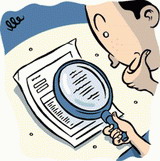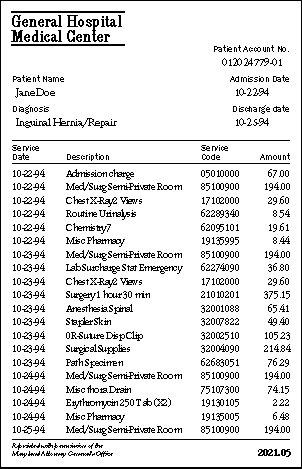 Probably the last thing you want to do after a hospital-stay is fine-tooth-comb the confusing computer codes and odd abbreviations on your bill. But it's worth the time and effort to review hospital bills carefully--you may be shocked at the number of costly errors you'll find. And if you think you don't have to worry about hospital charges because you're insured, take a close look at your policy. Most insurance companies require that patients make a co-payment (usually 20 percent of the total bill). Even if your policy says it covers 100 percent, that usually means it will pay for what the company considers to be "reasonable and customary." Anything above that amount comes out of your pocket. There are two other good reasons to be vigilant about bills. First, the more insurance companies have to shell out for hospital costs, the higher the premiums they will charge their customers. Second, some companies offer a reward of 25 percent of the savings to employees who find errors.
Probably the last thing you want to do after a hospital-stay is fine-tooth-comb the confusing computer codes and odd abbreviations on your bill. But it's worth the time and effort to review hospital bills carefully--you may be shocked at the number of costly errors you'll find. And if you think you don't have to worry about hospital charges because you're insured, take a close look at your policy. Most insurance companies require that patients make a co-payment (usually 20 percent of the total bill). Even if your policy says it covers 100 percent, that usually means it will pay for what the company considers to be "reasonable and customary." Anything above that amount comes out of your pocket. There are two other good reasons to be vigilant about bills. First, the more insurance companies have to shell out for hospital costs, the higher the premiums they will charge their customers. Second, some companies offer a reward of 25 percent of the savings to employees who find errors.
Hospital-Speak: What if I Can't Understand It?
In order to review your bill carefully, you will have to take it home. So don't pay in full when you're discharged. If you see that the bill is itemized by computer code, ask for a detailed bill with "simple English" descriptions of services so you can read it. Also be sure to ask the hospital to spell out all charges lumped under "miscellaneous."Is There Anything I Should Be Looking Out for?
Try to keep a diary of your hospital stay, including the dates you were there, type of room, doctor visits, and services and personal items you received. This record will give you something concrete to compare your final charges to. When you review the bill, eyeball these areas carefully:- Are the dates of your stay accurate? You don't want to pay for a three-day hospital stay if you were only there for two days.
- Did you receive all the services and products you are being charged for? This includes the type of room you had (private, semiprivate), TV and telephone rental, personal items (tissues, slippers), and medications and tests. Sometimes a whole series of items and tests are billed to you even though they were canceled by your doctor.
Note: Frequently, consumers complain that they were charged for an entire surgical or emergency kit even though only a few items from it were actually used. But according to the Attorney General's Office, this is a legitimate expense because these kits are sterile and have to be kept sealed until needed. Once they are opened, the rest of the kit is unusable.
- What exactly is grouped under the category labeled "miscellaneous"? Always ask for a detailed itemization.
- Have you been charged twice for the same service? Such double-billing is a common error.
- Did the hospital staff lose or misplace a patient's records, x-rays or tests results? If this happened to you and your tests were repeated, be sure you aren't charged for the replacements.
- Are the doctors who attended you, including anesthesiologists and radiologists, billing separately from the hospital? If that's the case, make sure there aren't any charges for their personal services on your hospital bill.
- Are there numbers that seem out of line? Clerical errors in punching in codes or figures may lead to overcharges.
- Finally, are there bill entries that you still don't understand or can't account for in your own records? Frankly, there are certain kinds of errors that even the most sophisticated consumer might not find. Charges for inappropriate treatments or unnecessary supplies and lab work can be hard to spot. If this is the case, ask a hospital representative and/or your doctor to review the bill with you.
What if I Find an Error?
If you do find an error in your bill, contact the hospital's business office or patient accounts supervisor immediately. Explain the errors you found in your bill and don't let them talk you out of your claim with platitudes like, "Don't worry, your insurance will cover it." Next, let your insurance company know about the errors. Put everything in writing and keep copies. If you are unable to resolve your billing dispute with the hospital, send your complaint in writing with a copy of the bill to the Office of Consumer Affairs of your state's Attorney General's Office.If You Need Help
In the event you have trouble dealing with your paperwork or getting payment from your insurance carrier, there are professionals you can turn to for help. For a referral to a claims assistance professional in your area, contact the Alliance of Claims Assistance Professionals (ACAP) at (888) 394-5163 (toll free) or visit their web site at www.claims.org. Click on the "Find a CAP" section.Can You Spot The Errors?
If Jane Doe had gone over her bill carefully, she would have saved over $490.00. Look over the sample hospital bill below. Can you find some of her overcharges? See errors at the bottom of the page.
Errors: (1) Double-billing for chest x-rays; (2) routine urine and chemistry tests were done earlier that week in a doctor's office, not the hospital; (3) the pharmacy fee is for sleeping pills refused by the patient; (4) the stapler and suture clip should have been covered under surgical supplies, not billed separately; (5) the pharmacy fee includes drugs canceled by the doctor; (6) the final room charge is in error, as the patient was already discharged 10-25-94; (7) the total is wrong--it should be $1944.76, an overcharge of $76.29 (the path specimen was added twice).
Look at bill again.
